
Alphabetical Menu
Chronological Menu
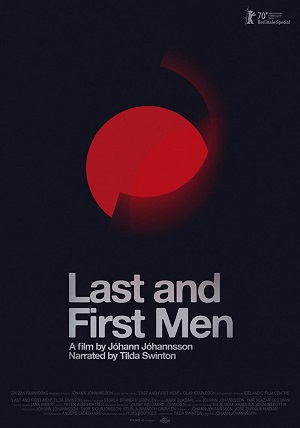
Last and First Men, directed by Jóhann Jóhannsson, is a visual poem based on the novel Last and First Men: A Story of the Near and Far Future by Olaf Stapleton. Much like Koyaanisqatsi, it has an unflinchingly bleak view of humanity while concurrently serving as a cautionary tale about humanity's future demise if we continue to destroy our environment. Poetry, after all, is a form of protest, and it's clear from the beginning that the doc has a lot to protest about how the human race is destroying itself. Tilda Swinton provides the voice of the narrator who's speaking from 2 million into the future from the planet of Neptune. If you can imagine Koyaanisqatsi without the iconic Philip Glass music and with a different, yet similarly ominous music score along with voice-over narration to guide you, you'll get an idea of what it's like to watch this documentary. Both films eventually become repetitive, although Last and First Men reaches that point earlier and leaves less room for interpretation because it has a narrator to guide the audience. Nonetheless, it's still an immersive experience and rewards audiences who have patience as the pace moves very slowly. Many of the images look breathtaking, especially in black-and-white, and speaks louder, so the narration feels a bit redundant and distracting whenever it does show up. There's also some brief shots of a red light that's reminiscent of Hal from the far more elliptical classic mind-fuck, 2001: A Space Odyssey. Last and First Men hits your emotions more than does the intellect, but its message about the end of the human race does compel the audience to step back and look at humanity from a different perspective while reminding them about the dangers of climate change. At a brief running time of 70 minutes, Last and First Men is a poetic, mesmerizing and haunting wake-up call for humanity. It opens at Metrograph via Metrograph Pictures. The Lady of Heaven 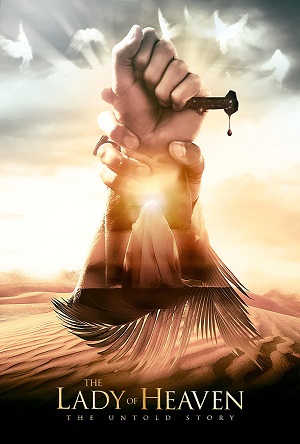
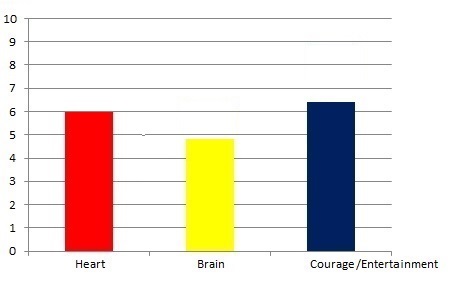 The Last Son 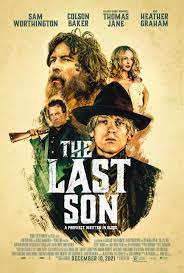 After Isaac Lemay (Sam Worthington), an outlaw, hears from a Native American elder about a prophecy that one of his children will kill him in the future, he sets out to track down his children and kill them one by one. Those children include his daughter, Megan (Emily Marie Palmer) and Cal (Colson Baker), whose mother, Anna (Heather Graham), works as a prostitute. Cal hopes to kill Isaac first, though. Meanwhile, Solomon (Thomas Jane), the local sheriff, also wants to hunt down Isaac. The Last Son has a premise that sounds like it could either be a wildly entertaining, lean and thrilling B-movie Western or a heartfelt Western with slow-burning suspense some action. Unfortunately, the screenplay by Greg Johnson doesn't take the film in either direction, so it ends up less than the sum of its parts and bites off more than it could chew. There are simply too many underdeveloped subplots, too many characters and no one to root for or connect with on a human level. Everyone seems to just be there to move the plot from Point A to Point B, but even the plot doesn't amount to anything exciting despite the premise's potential for suspense. None of the characters come to life, especially Isaac whom the film follows for the most part. Although Johnson avoids flashbacks to show the past relationships between Isaac, his children and their mother, there's not enough backstory included to flesh out those relationships more. Solomon once had a fling with Anna, but that's yet another poorly developed subplot that seems tacked-on. There's already enough conflict within the main narrative, so the addition of Solomon just makes everything more needlessly convoluted. To be fair, The Last Son doesn't go over-the-top like Quentin Tarantino's The Hateful Eight nor does it resort to shocking the audience or using profanity to entertain them, but it could've used something to invigorate it. Even the scenery and cinematography doesn't help to add much to hold the audience's attention. The Green Knight is a much better example of a genre film that took a seemingly simple narrative and turned it into a complex, bold and breathtaking as well as unconventional experience for the audience with both style and substance. The Last Son lacks both of those elements and resorts to conventionality too often. There's nothing wrong with that in and of itself, but unlike The Green Knight and the far superior Western The Power of the Dog, it quickly runs out of steam and monotony soon sets in, especially with the lack of imagination, poignancy and levity. The music score is solid, though, and the slow pace is refreshing and welcome, but those strengths are't enough to enliven The Last Son or to bring it any depth like in The Power of the Dog. The same can be said about the performance by Sam Worthington who's undermined by a weak screenplay that doesn't provide enough of a window into Isaac's heart, mind and soul, so it doesn't treat Isaac as a human being and makes it hard for the audience to see Isaac as a human being as well. At a running time of 1 hour and 36 minutes, which feels more like 2 hours, The Last Son is an anemic, shallow and forgettable Western that lacks palpable thrills, excitement and emotional resonance. If it were at least a mindlessly entertaining B-movie Western, it would've been a good double feature with the intelligent, understated and moving Western The Power of the Dog. 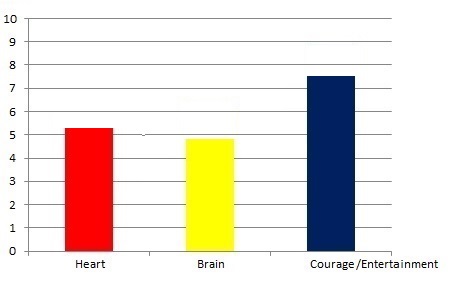 National Champions 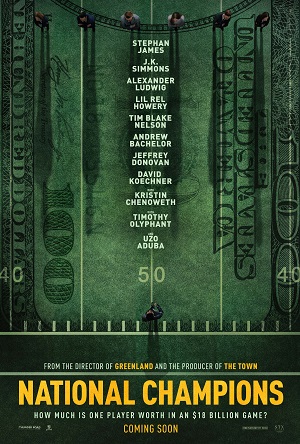 LeMarcus James (Stephan James), the star quarterback of a college football team, who goes on strike to fight for the right of fair compensation for all college football players a few days before a big football game. He persuades his fellow teammates, including Emmett Sunday (Alexander Ludwig), to join him in the strike while their coach, James Lazor (J.K. Simmons), tries to talk him out of it, and Mark Titus (Jeffrey Donovan), head of the NCAA, tries to use his legal team to smear LeMarcus to destroy his image. National Champions is the kind of movie that plays it so safe that it's ultimately less than the sum of its parts. A lot happens in the screenplay by Adam Mervis, yet it feels so slight and undercooked with too many characters and not enough of a focus on them as human beings. Procedural approaches could work if there's some level of suspense like in Erin Brockovich or if the audience spends time with one of the characters so that they can root for them. Trumbo is a better example of someone battling goliaths while still engaging the audience emotionally. That doesn't quite happen in National Champions. The film cares more about moving the plot forward than about anything else that would provide it with depth. The subplot involving James and the relationship with his wife, Bailey (Kristin Chenoweth), feels undeveloped. Unfortunately, the tensions between the football players, the NCAA and their lawyers feels underwhelming and makes the movie feel flat as a whole. Even when the NCAA's lawyer, Katherine Poe (Uzo Aduba), arrives to make LeMarcus' life a living hell by digging dirt on him, it still doesn't make the film any more exciting on a palpable level. In one of the film's clunky and contrived scenes, James delivers a big speech to his players which is yet another scene in National Champions where you can sense the wheels of the screenplay turning. Unfortunately, despite the solid cast none of them enliven the film or rise above its mediocre screenplay. J.K. Simmons has a much better-written character to sink his teeth into in Whiplash and he's also terrific in the biopic Being the Ricardos. Here he just feels wasted along with Tim Blake Nelson, Lil Rel Howery and David Koechner who show up way too briefly in a small roles. There's nothing exceptional about the cinematography or music score. The pace moves along fine, not too slow or fast, but some scenes, like the long speech by the coach mentioned before, goes on for too long and could've been edited tighter, although that's more of a script problem than an editing problem. At an overlong running time of 1 hour and 56 minutes National Champions, is overstuffed, undercooked and unfocused with a toothless, witless and bland screenplay. 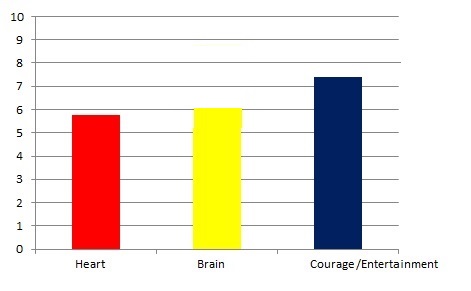 Off the Rails 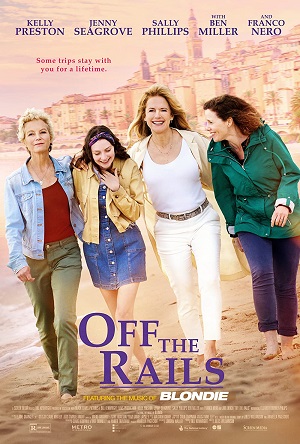
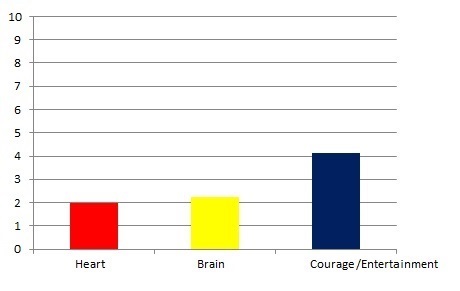 Red Rocket  Mikey Saber (Simon Rex), an ex-porn star, moves back to his small hometown in Texas after living in Los Angeles for a while. His wife, Lexi (Bree Elrod) reluctantly agrees to let him stay with her and her mother, Lil (Brenda Deiss), as long as he pays a portion of the rent. No one wants to hire him in town when he applies for jobs because of his experience in the porn industry. He hopes to make some money through porn once again when he befriends and seduces a 17-year-old girl, Strawberry (Suzanna Son), who works at a donut shop, and tries to convince her to become a porn star. Red Rocket works much better as a character study than as a comedy. The screenplay by writer/director Sean Baker and co-writer Chris Bergoch does have some humor in it, especially at the beginning when Mikey feels like a fish-out-of-water in his hometown. For the most part, though, it's a tragic story about a man who has a lot of growing up to do and lacks emotional maturity while engaging in toxic relationships. One of those toxic relationships is with Strawberry who's just as emotionally immature as Mikey. They're both emotionally needy people. She's still a child, technically, and he behaves like a child. Their relationship is doomed to fail from the get-go, but Mikey remains too immature to even realize that. Unsurprisingly, Strawberry lacks a father figure in her life which explains why she's into older guys like Mikey. The screenwriters should be commended for being unafraid to make Mikey and Strawberry unlikable characters. They're deeply flawed which makes them all the more human, but they're far from good role models. No one on screen is a good role model, and Red Rocket doesn't offer easy solutions to their problems either. A tragic incident involving Mikey and his friend, Lonnie (Ethan Darbone), makes them even more unlikable. The same can be said when Mikey confronts Strawberry's boyfriend to tell her that she's dumping him. Mikey clearly lacks empathy, compassion and boundaries. He's a controlling, lying, selfish narcissist. The filmmakers don't judge him, though, but let you, the audience, judge him if you wish to or to just experience him. Despite his many vices, he's like a whirlwind of energy and, like when seeing an accident, it's hard to look away whenever he's onscreen. There are also a few subtle and not-so-subtle political commentaries, i.e. a sign that reads "Make America Great Again." Mikey is poor, amoral, childish and delusional. Does that make him a microcosm of Trump's America? The answer to that question is also left for the audience to decide on their own. The ending, which won't be spoiled here, leaves room for interpretation, although it has shades of the ending of Sean Baker's The Florida Project. Simon Rex gives a lively, charismatic and invigorating performances as Mikey Saber. He truly sinks his teeth into the role and adds emotional depth occasionally. The character of Mikey feels like nails on a chalkboard sometimes, but Simon Rex's performance makes Mikey a slightly less grating character. Mikey is still over-the-top in some ways, yet he remains grounded for the most part. Bree Elrod and Brenda Deiss anchor the film with understated natural performances which counterbalance the high-energy of Mikey. There are some unflinching sex scenes that leave little to the imagination and give the film its hard R-rating, but this movie isn't fundamentally about sex or porn. Does Red Rocket need to be over 2 hours? No, it could've used tighter editing to make it a lean 90-minutes movie, and does lose a little dramatic momentum toward the end, but it's still entertaining for the most part. At a running time of 2 hours and 8 minutes, Red Rocket is audacious, provocative and surprisingly heartfelt with a wildly entertaining, charismatic performance by Simon Rex. It also boasts a pretty great soundtrack. 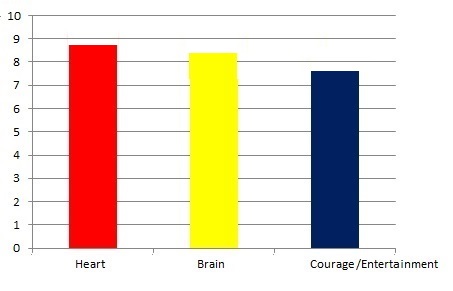 A Son  Fares (Sami Bouajila) drives down a highway in Tunisia with his wife, Meriem (Najla Ben Abdallah), beside him in the passenger seat and their 11-year-old son, Aziz (Youssef Khemiri), in the backseat, when terrorists suddenly ambush their car, injuring Aziz. They take him to the hospital where they learn that he desperately needs a liver transplant which he can only get from a specific blood type. Neither Fares nor Meriem are able to be one of those donors, and the waitlist for a liver transplant is very long. Why Fares can't be the organ donor won't be spoiled here because the screenplay by writer/director Mehdi Barsaoui has a major twist early on. Fortunately, the twist isn't what the movie is truly about, but it does make it more layered, complex and suspenseful. A Son, despite the title, is fundamentally about the relationship between a wife and her husband when faced with adversity and harsh truths that alter the dynamics of their relationship. In turn, the audience perceives Meriem differently once one of her secrets gets revealed. Fares, too, does something that changes the way you perceive him, but whether he made the right decision is up for interpretation. Barsaoui doesn't just Fares and Meriem, and doesn't ask the audience to judge them either; just to experience them. What follows is a gripping, intense and emotionally devastating story that's unafraid to go into dark territory and to show the characters in their most intimate moments as they struggle. The audience feels like a voyeur at times because the filmmakers make them feel as though they were watching a documentary. There's nothing Hollywood about A Son. There's no comic relief or any maudlin scenes or unnecessary subplots. There aren't even flashbacks even though the past does come back to haunt the characters. With a less sensitive screenplay, this could've easily turned into an overwrought, preachy, sappy Lifetime movie like Breakthrough. Everything that Breakthrough greats wrong, A Son gets right. It's not always a comfortable experience and demands the audience to deal with tough emotions, but that's part of the point. After all, Fares and Merem are dealing with tough emotions, too. It's not supposed to be comfortable. Kudos to Medhi Barsaoui for not sugar-coating anything. When Fares and his wife are sad, the audience feels the same way. When they're feeling hopeful, the audience feels hopeful too. When they're shocked and surprised, the audience feels like that, too. That's precisely why it's best not to know much about the plot or its few surprises beforehand. Sami Bouajila gives raw, natural performance as does Najla Ben Adballah. No one gives a hammy or wooden performance. The film's emotional depth comes both from the screenplay as well as from those stellar performances, so not a moment rings false throughout the film. Barsaoui also doesn't resort to shaky cam to generate tension; the tension comes from the narrative itself. There isn't any slick or stylish camerawork nor does there need to be. A Son remains grounded in humanism albeit the dark side of humanity, and it bravely stays that way from start to finish much like Mass and A Hero. The fact that Barsaoui accomplishes so much within just 1 hour and 36 minutes is a testament to his skills as a filmmaker and storyteller because it shows that he has restraint and focus while grasping the concept that less is more. Ultimately, A Son is gripping, provocative and profoundly moving. 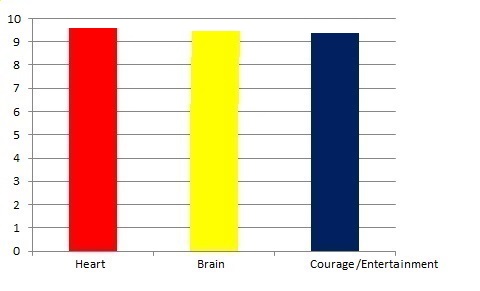 West Side Story  After a 1-year prison stint, Tony (Ansel Elgort), a former member of the Jets gang, returns to New York City where he gets a job working for Valentina (Rita Moreno) at her drugstore. He meets and falls in love with Maria (Rachel Zegler) at a local dance, but their forbidden love escalates the tensions between the Jets and their rival gang, the Sharks. Maria's brother, Bernardo (David Álvarez) is a member of the Sharks and wants her to date Chino (Josh Andrés Rivera). Riff (Mike Faist), Tony's friend, leads the Jets gang. Ariana DeBose plays Bernardo's girlfriend, Anita. West Side Story is not quite as powerful as the original, but it comes close enough. Spielberg deserves a lot of praise for finding the courage to remake such an iconic and beloved all-time classic. The screenplay by Tony Kushner has just the right blend of romance, drama, action, poignancy, joy and tragedy along with exciting musical numbers while avoiding cheesiness and clunkiness. The first few minutes serve as exposition to show the tensions between the Jets and the Sharks gang before they break into song on the streets of New York City, and the conflict between them and Lieutenant Schrank (Corey Stoll). To be fair, the pivotal scene when Tony meets Maria at the dance lacks the emotional punch of the original because it's shot differently with less visual poetry, but at least they develop palpable romantic chemistry after that scene. You can sense that they're in love and pine for one another, especially when Tony climbs up the side of Maria's apartment building to sing at her window. It's a magical scene that works on many levels, but it's especially notable for how sweet and moving it feels without being cloying. There's also just enough comic relief, wit and kernels of wisdom every now and then. Anita has some funny quips while Valentina provides the aphorisms to Tony. She's very much like a mother figure to him. Fortunately, the profound, timely messages about love, tolerance, forgiveness and compassion aren't heavy-handed or preachy. They're universal themes that also make the film relatable and engaging on a human level. Finding the right tone like West Side Story successfully accomplishes isn't only because of a well-written screenplay. It's also very dependent on the right casting. Everyone, even those in the smaller roles, are well-cast here and have a chance to shine. They all steal the show concurrently. Ansel Elgort is, surprisingly, pretty good at singing and gives the most heartfelt performance of his career thus far. It's hard to pick just one stand-out though because they're all such a terrific ensemble filled to the brim with charisma. Mike Faist, Rachel Zegler and Ariana DeBose give breakthrough performances while Rita Moreno provides plenty of gravitas in her role as Valentina. They each have memorable musical numbers that feel exhilarating. The wonderful choreography, costume designs, lighting, set designs and camerawork also helps to invigorate the musical numbers, particularly the delightful song-and-dance number "America". There's also an amusing dance number, "Gee, Officer Krupke", at a police station. Another unforgettable musical number takes place on a dock by the river and has impressive choreography and editing that must be seen on the big screen. West Side Story has ultimately just the right balance of Truth and Spectacle. It's a dazzling, exhilarating and genuinely heartfelt musical that will make you stand up and cheer. At a running time of 2 hours and 36 minutes, which doesn't feel that long, West Side Story is the best musical film of the year. It blows In the Heights and tick...tick..BOOM! out of the water. 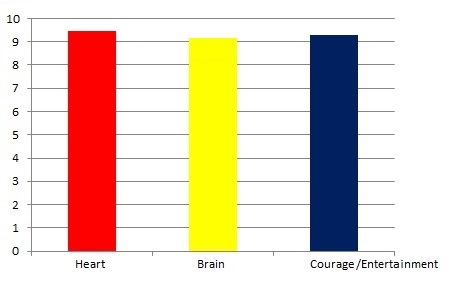 White on White 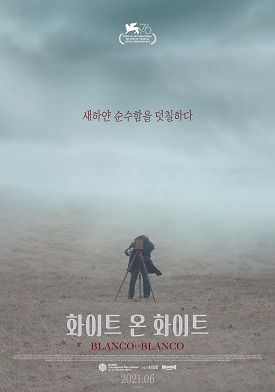 Pedro (Alfredo Castro), a photographer, arrives on an island in Tierra del Fuego, an archipelago in South America. He's tasked with photographing a child bride, Sara (Esther Vega Pérez Torres), who's about to marry a wealthy older man, Mr. Porter. Pedro struggles with his attraction to the younger girl which gets him into trouble. While the wedding is delayed, he agrees to photograph the killing of Tierra del Fuego's indigenous people. White on White has a premise that sounds intriguing, but the screenplay by writer/director Théo Court and co-writer Samuel M. Delgado leaves a lot to be desired. They rely too much on the imagination of the audience to fill in the gaps while eschewing Pedro's backstory or getting to know him on a human level. Pedro always remains at a cold emotional distance from the audience. With most great films, a character begins as a stranger to the audience, but by the end the audience no longer feels that way. That can't be said about Pedro. He's still a stranger by the end of White on White. Théo Court and Samuel M. Delgado don't design enough of a window into Pedro's heart, mind and soul, so it's hard to connect with him on an emotional and, more importantly, a human level. A lot remains off-screen, including most of the violence and even Mr. Porter who's never even shown. There's nothing inherently wrong with White on White's cold, elliptical approach. Kubrick's Eyes Wide Shut also followed that kind of approach. While both films have a lot going on beneath the surface, White on White doesn't have enough moments for the audience to look beneath the surface, so it feels underwhelming and lethargic more often than not. Eyes Wide Shut at least has some slow burn suspense; White on White definitely has slow burn, but lacks suspense or anything to hold the audience's attention beyond the cinematography. The cinematography in White on White is one of its few strengths because it's poetic and makes the most out of the landscape while adding both style and substance. Fortunately, the interesting title, which leaves room for interpretation, doesn't refer to the subtitles which are easy to read. Théo Court moves the film at a pace that's glacially slow. It's reminiscent of the recent film Azor which also trusted the audience's patience, but White on White begins to drag around the hour mark and to feel tedious, dry and monotonous without any wit or comic relief to counterbalance its heaviness. Alfredo Castro gives a decent performance and adds some charisma to his role as Pedro, but his charisma feels muted and he fails to rise above the bland screenplay. The last 20 minutes or so are intense, but feel like a completely different film that leaves nothing to the imagination all of a sudden. At least the filmmakers didn't include voice-over narration to spoon-feed the audience, but it would've been helpful to include at least a little bit more exposition or something to hold the audience's attention beyond the film's poetic visual style. At a running time of 1 hour and 40 minutes, which feels more like 3 hours, White on White is lyrical and occasionally provocative with exquisite cinematography, but it's often dull, meandering and underwhelming while failing to pack an emotional punch. 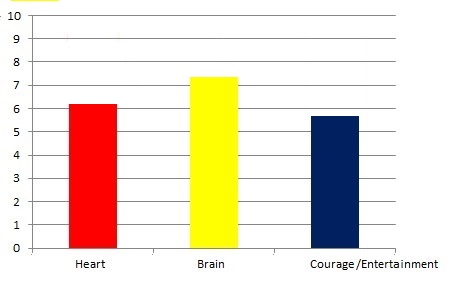 |